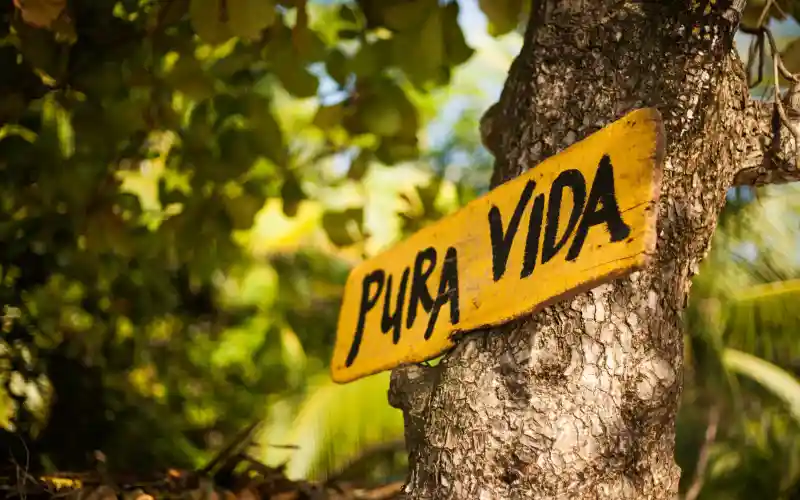Business
Costa Rica Grants First Medical Cannabis Cultivation License

Costa Rica’s medical cannabis market just hit its most recent milestone.
Just over a year after legalizing hemp and medical cannabis, Costa Rica’s Minister of Agriculture and Livestock Victor Carvajal signed a resolution to grant authorization to Azul Wellness S.A. to cultivate and process medical cannabis, The Tico Times reports.
It marks the first medical cannabis license granted in the Central American country.
Azul Wellness S.A. is Costa Rican owned and backed by the family of José Álvaro Jenkins, president of the Costa Rican Union of Chambers and Associations of the Private Business Sector. Azul reportedly is planning to establish an 800-square-meter production and processing facility, located in Costa Rica’s Guanacaste province.
The firm also partnered with U.S. private equity firm Merida Capital Holdings, which specializes in medical cannabis. According to the Times, the collaboration is meant to help Azul cultivate two varieties of psychoactive cannabis to start, with a focus on exporting the produced material.
Jenkins himself expressed optimism about the endeavor and said he envisions eventually establishing a medical cannabis laboratory in Costa Rica. He has also publicly supported the government’s efforts to legalize recreational cannabis in the past.
While Azul received the first medical cannabis license, Carvajal has issued eight authorizations for hemp cultivation. There are still two applications for hemp cultivation and processing and one medical cannabis license under evaluation.
Costa Rica legalized hemp and medical cannabis in March 2022. President Rodrigo Chaves unveiled a draft law several months later to lay the legal foundation for the country’s medical cannabis and hemp markets, specifically looking at production and sales. The Costa Rican government controls the cannabis industry — including granting permits related to industrial hemp and medical cannabis — under regulation of the Ministry of Health and the minister of agriculture and livestock.
Around that same time, Chaves also presented a bill to the Legislative assembly to legalize the recreational use of cannabis in Costa Rica. He promised the initiative shortly after taking his role, nodding to the fact that recreational use of cannabis is a reality we cannot turn away from.
“It is no secret to anyone that marijuana is consumed in Costa Rica, more and more openly in the streets and parks. It is a reality,” Chaves said in a translation during a press conference.
He’s admitted that he personally does not agree with the consumption of cannabis, though he believes that it’s best to regulate the market so Costa Rica can reap the benefits.
“That they pay taxes, that generates formal employment; It is very clear that it is not an easy issue, many people of good faith have doubts,” he said.
As of January 2023, the government was set to present a substitute text to the recreational legalization bill after receiving feedback from different institutions, according to The Tico Times. Originally, the plan would have allowed recreational cannabis companies to operate under the Free Trade Zone regime, meaning consumers could feasibly go to clubs, coffee shops and other businesses to buy cannabis products.
A number of institutions, including The Judicial Investigation Organism (OIJ), the Medical Association, the College of Psychiatrists, the Institute of Alcoholism and Drug Addiction (IAFA), the Evangelical Alliance Federation and some municipalities, shared their opposition and requested the proposal’s dismissal.
And even though a number of other institutions and businesses in the country support the proposal, citing similar benefits as Chaves like economic growth and opportunity, citizens aren’t quite on board. According to a survey conducted by the School of Statistics of the University of Costa Rica, 76.5% of Costa Ricans approve of medical cannabis, but only 35.4% support recreational legalization.
Costa Rica joins a number of other Latin American countries with legal medical cannabis, including Argentina, Chile, Colombia, Ecuador, Mexico, Panama, Paraguay and Peru. Uruguay is the only Latin American country with legalized recreational cannabis.
Regarding hemp, Costa Rican law defines industrial hemp as the plant or part or the plant and its derivatives, with extracting to contain no more than 1% THC by dry weight. The U.S. currently defines hemp as 0.3% THC or less, though farmers have advocated to change the limit to 1% as well with the upcoming 2023 Farm Bill.
Source: https://hightimes.com/news/costa-rica-grants-first-medical-cannabis-cultivation-license/
Business
New Mexico cannabis operator fined, loses license for alleged BioTrack fraud

New Mexico regulators fined a cannabis operator nearly $300,000 and revoked its license after the company allegedly created fake reports in the state’s traceability software.
The New Mexico Cannabis Control Division (CCD) accused marijuana manufacturer and retailer Golden Roots of 11 violations, according to Albuquerque Business First.
Golden Roots operates the The Cannabis Revolution Dispensary.
The majority of the violations are related to the Albuquerque company’s improper use of BioTrack, which has been New Mexico’s track-and-trace vendor since 2015.
The CCD alleges Golden Roots reported marijuana production only two months after it had received its vertically integrated license, according to Albuquerque Business First.
Because cannabis takes longer than two months to be cultivated, the CCD was suspicious of the report.
After inspecting the company’s premises, the CCD alleged Golden Roots reported cultivation, transportation and sales in BioTrack but wasn’t able to provide officers who inspected the site evidence that the operator was cultivating cannabis.
In April, the CCD revoked Golden Roots’ license and issued a $10,000 fine, according to the news outlet.
The company requested a hearing, which the regulator scheduled for Sept. 1.
At the hearing, the CCD testified that the company’s dried-cannabis weights in BioTrack were suspicious because they didn’t seem to accurately reflect how much weight marijuana loses as it dries.
Company employees also poorly accounted for why they were making adjustments in the system of up to 24 pounds of cannabis, making comments such as “bad” or “mistake” in the software, Albuquerque Business First reported.
Golden Roots was fined $298,972.05 – the amount regulators allege the company made selling products that weren’t properly accounted for in BioTrack.
The CCD has been cracking down on cannabis operators accused of selling products procured from out-of-state or not grown legally:
- Regulators alleged in August that Albuquerque dispensary Sawmill Sweet Leaf sold out-of-state products and didn’t have a license for extraction.
- Paradise Exotics Distro lost its license in July after regulators alleged the company sold products made in California.
Golden Roots was the first alleged rulebreaker in New Mexico to be asked to pay a large fine.
Source: https://mjbizdaily.com/new-mexico-cannabis-operator-fined-loses-license-for-alleged-biotrack-fraud/
Business
Marijuana companies suing US attorney general in federal prohibition challenge

Four marijuana companies, including a multistate operator, have filed a lawsuit against U.S. Attorney General Merrick Garland in which they allege the federal MJ prohibition under the Controlled Substances Act is no longer constitutional.
According to the complaint, filed Thursday in U.S. District Court in Massachusetts, retailer Canna Provisions, Treevit delivery service CEO Gyasi Sellers, cultivator Wiseacre Farm and MSO Verano Holdings Corp. are all harmed by “the federal government’s unconstitutional ban on cultivating, manufacturing, distributing, or possessing intrastate marijuana.”
Verano is headquartered in Chicago but has operations in Massachusetts; the other three operators are based in Massachusetts.
The lawsuit seeks a ruling that the “Controlled Substances Act is unconstitutional as applied to the intrastate cultivation, manufacture, possession, and distribution of marijuana pursuant to state law.”
The companies want the case to go before the U.S. Supreme Court.
They hired prominent law firm Boies Schiller Flexner to represent them.
The New York-based firm’s principal is David Boies, whose former clients include Microsoft, former presidential candidate Al Gore and Elizabeth Holmes’ disgraced startup Theranos.
Similar challenges to the federal Controlled Substances Act (CSA) have failed.
One such challenge led to a landmark Supreme Court decision in 2005.
In Gonzalez vs. Raich, the highest court in the United States ruled in a 6-3 decision that the commerce clause of the U.S. Constitution gave Congress the power to outlaw marijuana federally, even though state laws allow the cultivation and sale of cannabis.
In the 18 years since that ruling, 23 states and the District of Columbia have legalized adult-use marijuana and the federal government has allowed a multibillion-dollar cannabis industry to thrive.
Since both Congress and the U.S. Department of Justice, currently headed by Garland, have declined to intervene in state-licensed marijuana markets, the key facts that led to the Supreme Court’s 2005 ruling “no longer apply,” Boies said in a statement Thursday.
“The Supreme Court has since made clear that the federal government lacks the authority to regulate purely intrastate commerce,” Boies said.
“Moreover, the facts on which those precedents are based are no longer true.”
Verano President Darren Weiss said in a statement the company is “prepared to bring this case all the way to the Supreme Court in order to align federal law with how Congress has acted for years.”
While the Biden administration’s push to reschedule marijuana would help solve marijuana operators’ federal tax woes, neither rescheduling nor modest Congressional reforms such as the SAFER Banking Act “solve the fundamental issue,” Weiss added.
“The application of the CSA to lawful state-run cannabis business is an unconstitutional overreach on state sovereignty that has led to decades of harm, failed businesses, lost jobs, and unsafe working conditions.”
Business
Alabama to make another attempt Dec. 1 to award medical cannabis licenses

Alabama regulators are targeting Dec. 1 to award the first batch of medical cannabis business licenses after the agency’s first two attempts were scrapped because of scoring errors and litigation.
The first licenses will be awarded to individual cultivators, delivery providers, processors, dispensaries and state testing labs, according to the Alabama Medical Cannabis Commission (AMCC).
Then, on Dec. 12, the AMCC will award licenses for vertically integrated operations, a designation set primarily for multistate operators.
Licenses are expected to be handed out 28 days after they have been awarded, so MMJ production could begin in early January, according to the Alabama Daily News.
That means MMJ products could be available for patients around early March, an AMCC spokesperson told the media outlet.
Regulators initially awarded 21 business licenses in June, only to void them after applicants alleged inconsistencies with how the applications were scored.
Then, in August, the state awarded 24 different licenses – 19 went to June recipients – only to reverse themselves again and scratch those licenses after spurned applicants filed lawsuits.
A state judge dismissed a lawsuit filed by Chicago-based MSO Verano Holdings Corp., but another lawsuit is pending.
Source: https://mjbizdaily.com/alabama-plans-to-award-medical-cannabis-licenses-dec-1/
-

 Business2 years ago
Business2 years agoPot Odor Does Not Justify Probable Cause for Vehicle Searches, Minnesota Court Affirms
-

 Business2 years ago
Business2 years agoNew Mexico cannabis operator fined, loses license for alleged BioTrack fraud
-

 Business2 years ago
Business2 years agoAlabama to make another attempt Dec. 1 to award medical cannabis licenses
-

 Business2 years ago
Business2 years agoWashington State Pays Out $9.4 Million in Refunds Relating to Drug Convictions
-

 Business2 years ago
Business2 years agoMarijuana companies suing US attorney general in federal prohibition challenge
-

 Business2 years ago
Business2 years agoLegal Marijuana Handed A Nothing Burger From NY State
-

 Business2 years ago
Business2 years agoCan Cannabis Help Seasonal Depression
-

 Blogs2 years ago
Blogs2 years agoCannabis Art Is Flourishing On Etsy









